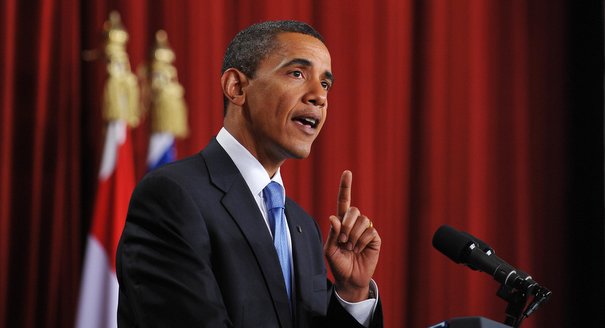Dmitri Trenin
{
"authors": [
"Dmitri Trenin"
],
"type": "legacyinthemedia",
"centerAffiliationAll": "",
"centers": [
"Carnegie Endowment for International Peace",
"Carnegie Russia Eurasia Center"
],
"collections": [],
"englishNewsletterAll": "",
"nonEnglishNewsletterAll": "",
"primaryCenter": "Carnegie Russia Eurasia Center",
"programAffiliation": "",
"programs": [],
"projects": [],
"regions": [
"North America",
"United States",
"Caucasus",
"Russia"
],
"topics": [
"Political Reform",
"Foreign Policy",
"Nuclear Policy"
]
}
Source: Getty
Grading Obama
On the anniversary of President Obama’s election, relations with Russia have become a bright spot among the president’s ambitious foreign policy efforts, while other central international goals remain unachieved.
Source: Foreign Policy

As president-elect, Barack Obama moved to reset the entire U.S. foreign policy. A year later, he is still committed to winding down U.S. military involvement in Iraq; defeating al Qaeda while stabilizing Afghanistan, and helping Pakistan stabilize itself; helping a Palestinian state emerge, in peace with Israel; engaging Iran in an effort to prevent it from going nuclear; negotiating away North Korea’s nukes; jointly reducing strategic arsenals with Russia and building a case for ratifying the comprehensive test ban treaty; and addressing climate change. His biggest foreign-policy concern in the first year at the White House, of course, was mounting a concerted global effort to deal with the economic crisis.
He managed to restore America’s moral standing in the world through practical steps: closing Guantánamo, listening to other countries’ concerns, making U.S. goals clear, and boldly embracing a broad vision of the future. At the same time, Obama has been stepping carefully, seeking to combine lofty principles and pragmatic interests. Not only did he provide sustained leadership, but, almost miraculously, he managed to keep his high-powered and ambitious foreign policy team cooperating among themselves, instead of fighting with one another. Yet, he has not achieved much regarding his central international goals. And, he was visibly embarrassed by his winning of the Nobel Peace Prize, probably granted more to stimulate his behavior than to recognize his good deeds.
Achievements will be exceedingly difficult to score. Afghanistan, the war he has adopted, does not look good. Neither does Pakistan. Reaching an acceptable agreement with Iran -- making it a certifiably non-nuclear weapons state -- will stretch almost to the limit the human capacity for diplomacy. In the short term, one thing looks surprisingly bright: relations with Russia, a non-priority on inauguration day, which is about to yield a new strategic arms reduction treaty and promises closer cooperation on high-priority issues, such as Afghanistan and Iran. To many observers, this may not amount to much. Yet, slightly over a year ago, the United States and Russia were on a collision course. Turning that relationship around has not been a bad thing.
About the Author
Former Director, Carnegie Moscow Center
Trenin was director of the Carnegie Moscow Center from 2008 to early 2022.
- Mapping Russia’s New Approach to the Post-Soviet SpaceCommentary
- What a Week of Talks Between Russia and the West RevealedCommentary
Dmitri Trenin
Recent Work
Carnegie does not take institutional positions on public policy issues; the views represented herein are those of the author(s) and do not necessarily reflect the views of Carnegie, its staff, or its trustees.
More Work from Carnegie Endowment for International Peace
- Iran Is Pushing Its Neighbors Toward the United StatesCommentary
Tehran’s attacks are reshaping the security situation in the Middle East—and forcing the region’s clock to tick backward once again.
Amr Hamzawy
- The Gulf Monarchies Are Caught Between Iran’s Desperation and the U.S.’s RecklessnessCommentary
Only collective security can protect fragile economic models.
Andrew Leber
- Europe on Iran: Gone with the WindCommentary
Europe’s reaction to the war in Iran has been disunited and meek, a far cry from its previously leading role in diplomacy with Tehran. To avoid being condemned to the sidelines while escalation continues, Brussels needs to stand up for international law.
Pierre Vimont
- Lessons Learned from the Biden Administration’s Initial Efforts on Climate MigrationArticle
In 2021, the U.S. government began to consider how to address climate migration. The outcomes of that process offer useful takeaways for other governments.
Jennifer DeCesaro
- India Signs the Pax Silica—A Counter to Pax Sinica?Commentary
On the last day of the India AI Impact Summit, India signed Pax Silica, a U.S.-led declaration seemingly focused on semiconductors. While India’s accession to the same was not entirely unforeseen, becoming a signatory nation this quickly was not on the cards either.
Konark Bhandari









